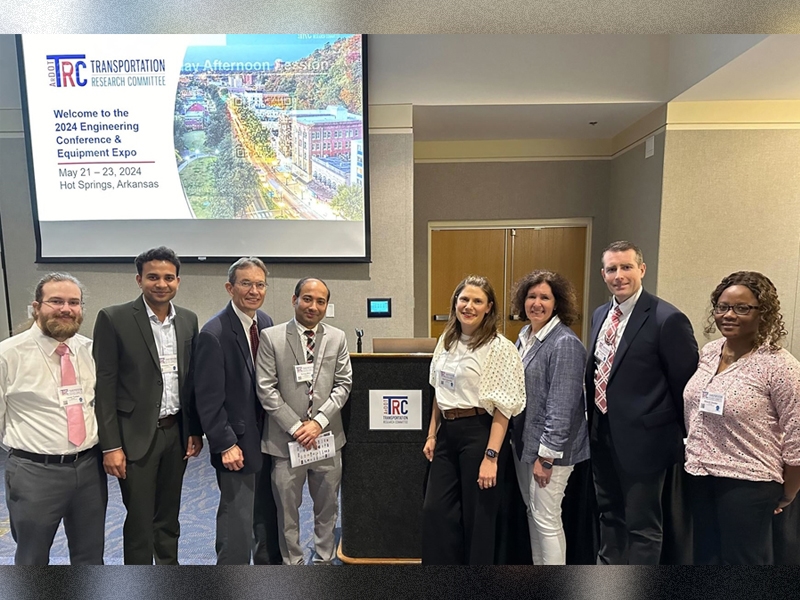
The Arkansas Department of Transportation's Transportation Research Committee conference and equipment expo was recently held in Hot Springs. This annual event serves as a vital platform for presenting the latest advancements in transportation research, technology, and equipment. Civil engineering graduate students Shuyah Ouoba, Tanner Turben, and Amarjeet Tiwari, along with faculty members Ernie Heymsfield, Suman Mitra, Sarah Hernandez, Stacy Williams, Cameron Murray and Michelle Barry, were among those who presented their research.
The conference featured presentations from industry experts who discussed innovative research projects and future trends in transportation infrastructure. Attendees had the opportunity to participate in workshops and panel discussions covering a variety of topics, including safety improvements, construction techniques, and sustainable practices.
Doctoral student Shuyah Ouoba provided an update on Project TRC2203, which focuses on low shrinkage concrete mixtures for Arkansas. "Transverse cracking affects the durability of concrete bridge decks and primarily results from drying shrinkage. Basic mixtures were prepared using the current Department of Transportation specified mixture proportions and different coarse aggregate types typically used in the state. These mixes were then optimized by adjusting the coarse aggregate gradation and reducing the cement content by 5.9% and 15.4%. Substitution with 20% and 30% Class C fly ash was also made. The fresh and hardened concrete properties, such as the drying shrinkage and electrical bulk resistivity, are tested and compared to evaluate any potential improvements."
Faculty members presented their research projects on several topics:
- Michelle Barry: TRC2104 – Maintenance Guidelines for MSE Walls
- Suman Mitra: TRC2101 – Update of the ARDOT Workforce Forecasting System
- Ernie Heymsfield: TRC2103 – Developing Guidelines for Evaluating Weathering Steel Bridges, and TRC1903 – Investigating Concrete Deck Cracking in Continuous Steel Bridges
- Sarah Hernandez: TRC2303 – Evaluation of Impacts Due to A Bridge Closure
- Cameron Murray: TRC2204 – Materials Testing Specifications for Drilled Shaft Concrete
In addition to the research update sessions, research project posters were displayed throughout the conference, providing more information and updates about the ongoing projects in Arkansas. Master's student Tanner Turben presented a research poster titled "Impact of Equipment Type on Particle Size Measurement of Civil Engineering Materials."
Faculty members also submitted posters for other projects, including:
- Clint Wood: TRC2106 – Applying UAS Lidar for Developing Small Project Terrain Models, and TRC2202 – Updating ARDOT Liquification Evaluation Procedures
- Rick Coffman: TRC2107 – Non-Nuclear Moisture Content and Density Determination, and TRC2204 – Materials and Testing Specifications for Drilled Shaft Concrete
- Michelle Barry: TRC2104 – Maintenance Guidelines for MSE Walls
- Ernie Heymsfield and Cameron Murray: TRC1903 – Investigating Concrete Deck Cracking in Continuous Steel Bridges
- Cameron Murray: TRC2203 – Low Shrinkage Concrete Mixtures for Arkansas
- Andrew Braham: TRC2201 – Update to ARDOT Superpave Gyratory Compaction (SGC) Specification to Increase Pavement Durability
- Sarah Hernandez: TRC2303 – Evaluation of Impacts Due to a Bridge Closure: A Case Study of the Mississippi River Bridges in Arkansas
- Suman Mitra: TRC2101 – Update of the ARDOT Workforce Forecasting System, TRC2302 – Development of Pedestrian and Bicyclist Flow Volumes and Risk Factors, and TRC2301 – Smart Work Zone (SWZ) System Design, Specifications, Estimates, and Implementation Guidelines
These projects aim to help Arkansas Department of Transportation design transportation infrastructure that enhances public safety and longevity, ultimately saving lives and tax dollars in Arkansas. The event also provided students with valuable real-world experience that will benefit their future careers.
The equipment expo showcased the latest tools and machinery used in transportation projects, including demonstrations of new construction equipment, traffic management systems, and other technologies designed to improve efficiency and safety in transportation infrastructure.
This annual event fosters knowledge sharing and collaboration between professionals, as well as between the public and private sectors, to enhance Arkansas' transportation systems. For more information about the conference and equipment expo, please visit the Arkansas Department of Transportation website.
About the Department of Civil Engineering: Established in 1897, the Civil Engineering Department at the University of Arkansas is renowned for its commitment to academic excellence and innovative research. Accredited by the Accreditation Board for Engineering and Technology (ABET), the department offers comprehensive undergraduate and graduate programs that prepare students for successful careers in civil engineering. With a focus on hands-on learning, cutting-edge research, and industry partnerships, our faculty and students tackle critical societal challenges in sustainable infrastructure, transportation, structural, environmental engineering, and water resources. Dedicated to fostering a supportive and inclusive environment, the department equips graduates with the skills and professional network necessary to excel and make significant contributions to the field. For more information, visit our website.
Topics
Contacts
Mike Emery, media specialist
Department of Civil Engineering
479-387-3931,